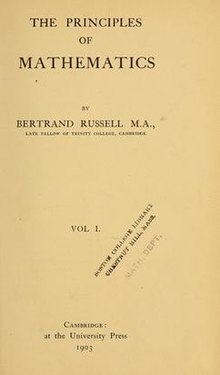The Principles of Mathematics

Title page of first edition
|
|
| Author | Bertrand Russell |
|---|---|
| Translator | Louis Couturat |
| Country | United Kingdom |
| Language | English |
| Series | I. (all published.) |
| Subject | Mathematics, Logic |
| Genre | Foundations of mathematics, Symbolic logic |
| Publisher | Cambridge University Press |
|
Publication date
|
1903, 1938, 1951, 1996, and 2009 |
| Pages | 534 (first edition) |
| ISBN | Paperback edition |
| OCLC | 1192386 |
| Website | http://fair-use.org/bertrand-russell/the-principles-of-mathematics/ |
The Principles of Mathematics is a book written by Bertrand Russell in 1903. In it he presented his famous paradox and argued his thesis that mathematics and logic are identical.
The book presents a view of the foundations of mathematics and has become a classic reference. It reported on developments by Giuseppe Peano, Mario Pieri, Richard Dedekind, Georg Cantor, and others.
In 1905 Louis Couturat published a partial French translation that expanded the book's readership. In 1937 Russell prepared a new introduction saying, "Such interest as the book now possesses is historical, and consists in the fact that it represents a certain stage in the development of its subject." Further editions were printed in 1938, 1951, 1996, and 2009.
The Principles of Mathematics consists of 59 chapters divided into seven parts: indefinables in mathematics, number, quantity, order, infinity and continuity, space, matter and motion.
In chapter one, "Definition of Pure Mathematics," Russell asserts that :
The fact that all Mathematics is Symbolic Logic is one of the greatest discoveries of our age; and when this fact has been established, the remainder of the principles of mathematics consists in the analysis of Symbolic Logic itself.
There is an anticipation of relativity physics in the final part as the last three chapters consider Newton's laws of motion, absolute and relative motion, and Hertz's dynamics. However, Russell rejects what he calls "the relational theory", and says on page 489 :
In his review, G. H. Hardy says "Mr. Russell is a firm believer in absolute position in space and time, a view as much out of fashion nowadays that Chapter [58: Absolute and Relative Motion] will be read with peculiar interest."
Reviews were prepared by G. E. Moore and Charles Sanders Peirce, but Moore's was never published and that of Peirce was brief and somewhat dismissive. He indicated that he thought it unoriginal, saying that the book "can hardly be called literature" and "Whoever wishes a convenient introduction to the remarkable researches into the logic of mathematics that have been made during the last sixty years [...] will do well to take up this book."
...
Wikipedia
